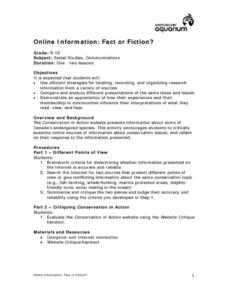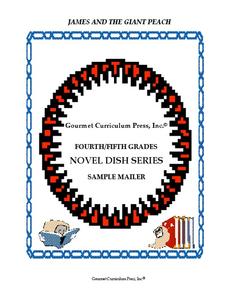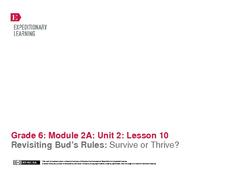National Endowment for the Humanities
The 1828 Campaign of Andrew Jackson: Expansion of the Voting Base
Students give examples to indicate how the franchise was extended and limited in the first half of the 19th century, and cite some differences in the newly enfranchised population that could affect the way they would vote.
Curated OER
President Madison's 1812 War Message: Answers Lead to More Questions
Students investigate President Madison's case for declaring war against Great Britain. Students assume the roles of newspaper reporters and cite key points in Madison's argument for declaring war, and hypothesize about primary documents...
Curated OER
Eggs
Are you looking for a lesson on eggs for your young farmers? This one could be for you! Learners discover where eggs come from. They see the whole process of an egg coming from a hen, and ending up on their breakfast tables. They...
Curated OER
The Study of Theme and Figurative Language in Poetry and/or Prose
Identify and analyze the use of figurative language used in select pieces of writing. These pieces of literature will represent at least two pieces by one writer and at least two pieces by different writers. This instructional activity...
Curated OER
Online Information: Fact or Fiction
Discuss ways to determine if the information middle and high schoolers gather online is accurate. Using the Internet, they cite two sources that show conflicting points of view on a subtopic of conservation. They summarize and analyze...
Curated OER
Introducing Jane Eyre
"How can a magazine reflect a particular time and culture?" Using this prompt, your class explores the Victorian Era as it relates to Charlotte Bronte's Jane Eyre. They can also play the "Victorian Women's Rights" game for the year 1840...
Curated OER
Kumeyaay Indians
Useful for literary analysis, citing textual evidence, or summary skills, this activity about the Kumeyaay Indians would be a good addition to your language arts class. Middle schoolers read novels and summarize the literature in their...
Curated OER
New York State Testing Program: English Language Arts Book 2
Practice listening and writing skills with this resource. This is a test created by the New York State Testing Program. Learners listen to a passage called "Leonardo da Vinci's Mona Lisa" twice and write responses to the selection. They...
Curated OER
A Year in Review: The Memoir
If you are planning a unit on memoir and autobiographical narrative, you should consider this resource. Using Internet research skills, pupils review works by James Frey and Henry David Thoreau. In response to these works, learners...
Curated OER
Do you say it this way?
Whether your pupils are young native English speakers, or learning English as a second language, subject-verb inconsistencies are common. Twenty slides are provided in this presentation to help explain this grammar issue. The first six...
Media Smarts
Broadcasting Codes
Let your learners be the judges for a series of case studies that focus on broadcast codes in Canada. In order to familiarize your class with the codes and guidelines that govern the broadcasting industry, in particular Canada's...
Curated OER
Note-Taking: K.I.S.S. "Keep It Short and Simple"
Note-taking is an essential study skill, and it needs to be taught! In the context of a research project on energy sources, learners find multiple sources, evaluating, paraphrasing, and citing them correctly. Two lists with note-taking...
Curated OER
Reading Comprehension: Obesity and Food Deserts
Read this selection about "food deserts," places where high poverty rates limit access to healthy foods with your class. Six multiple choice questions on comprehension, inferences, vocabulary, and citing the text follow the selection and...
Curated OER
MLA Electronic Source Citation
After your class is relatively familiar with plagiarism and different citation formats, introduce them to MLA with this presentation. Actual documents are used to practice citing sources, so it's a great opportunity to get your class...
Curated OER
In Text Citations
What is citation? Why cite? Researchers are introduced to the Modern Language Association (MLA) style guide for research writing. Examples are plentiful and color-coded to highlight specific aspects of the conventions.
English Linx
Textual Evidence Worksheet
Perfect for a unit on characterization and simple enough to use with any text. Your class will practice the Common Core standard of citing textual evidence to support their analysis by first making an assertion about a character from a...
Hawaiʻi State Department of Education
Story Design
Stories contain very specific elements; plot, characters, and key events. Learners use pantomime to retell a key event from the beginning, middle, and end of a story. They discuss setting and character as each group discusses and then...
Shodor Education Foundation
Sets and the Venn Diagram (Beginner)
Venn diagrams are helpful in understanding the idea of a set and using attributes to sort items. This basic plan is an introduction with an added bonus of an applet that can be used to demonstrate the activity. If a classroom of...
Gourmet Curriculum Press
James and the Giant Peach
Here is a 19-page sample lesson that uses an interesting format. It starts with an appetizer or activity to make reading the book James and the Giant Peach fun. Then it dives into the main course or core content instruction which...
K12 Reader
Finding Text Evidence: Frederick Douglass
After reading a very brief excerpt from Frederick Douglass' autobiography, learners cite textual evidence to support a main idea of the primary source about Douglass' humiliating experience with slavery. This is a brief exercise that...
EngageNY
Text-Dependent Questions Text-Dependent Questions and Making a Claim: Digging Deeper into Paragraphs 12–14 of Steve Jobs’ Commencement Address (and connecting to Chapter 9)
Readers draw connections between Bud, Not Buddy and Steve Jobs' 2005 Stanford University commencement address and cite evidence from the two texts to support their analysis.
K12 Reader
Traveling to the Distant West
If you build it they can come. After reading a short article about the impact of western expansion, middle schoolers cite evidence from the article to explain how this expansion forced changes in transportation.
K12 Reader
Setting the Scene: Great Expectations
Expect great things from this reading comprehension exercise that asks readers to cite evidence from the provided passages of Great Expectations to support the inference that Charles Dickens' Miss Havisham, and her room, are indeed strange.
EngageNY
Revisiting Bud’s Rules: Survive or Thrive?
Bud followed a series of rules from Bud, Not Buddy by Christopher Paul Curtis. The question is, how did he use those rules to thrive or survive? After a grand discussion, class members explore the novel to locate and cite textual...
Other popular searches
- Cite Evidence in Text
- Cite a Bibliography
- Cite Evidence
- Cite Sources
- Cite Textual Evidence
- How to Cite
- How Work Cite
- Cite Internet Reference
- Cite Internet Sources
- Cite Words
- Cite and Town
- Cite Online Sources

























